MOD006959: AI in Healthcare - Pfizer Inc. Report Analysis
VerifiedAdded on 2023/01/12
|10
|3089
|30
Report
AI Summary
This report provides a comprehensive analysis of the application, benefits, and challenges of Artificial Intelligence (AI) within the healthcare industry, specifically focusing on Pfizer Inc. The report begins with an introduction to AI and its significance, followed by an examination of AI applications such as managing medical records and virtual nurses. It then delves into the capabilities of AI, including easy diagnosis and effective treatment strategies, while also addressing the challenges of AI implementation, such as data integrity, availability, and privacy concerns. The benefits of AI, including improved diagnosis, cost reduction, and efficient record management, are discussed. Furthermore, the report explores the legal, ethical, and social challenges associated with AI, including privacy issues, intellectual property concerns, and potential discrimination. The impact of AI on healthcare delivery, particularly in cardiovascular diagnosis, is highlighted. Finally, the report concludes by examining the challenges AI poses for patients and care providers, such as the lack of emotional connection and potential for caregiver laziness, offering a balanced perspective on the transformative potential and the critical considerations surrounding AI in healthcare.
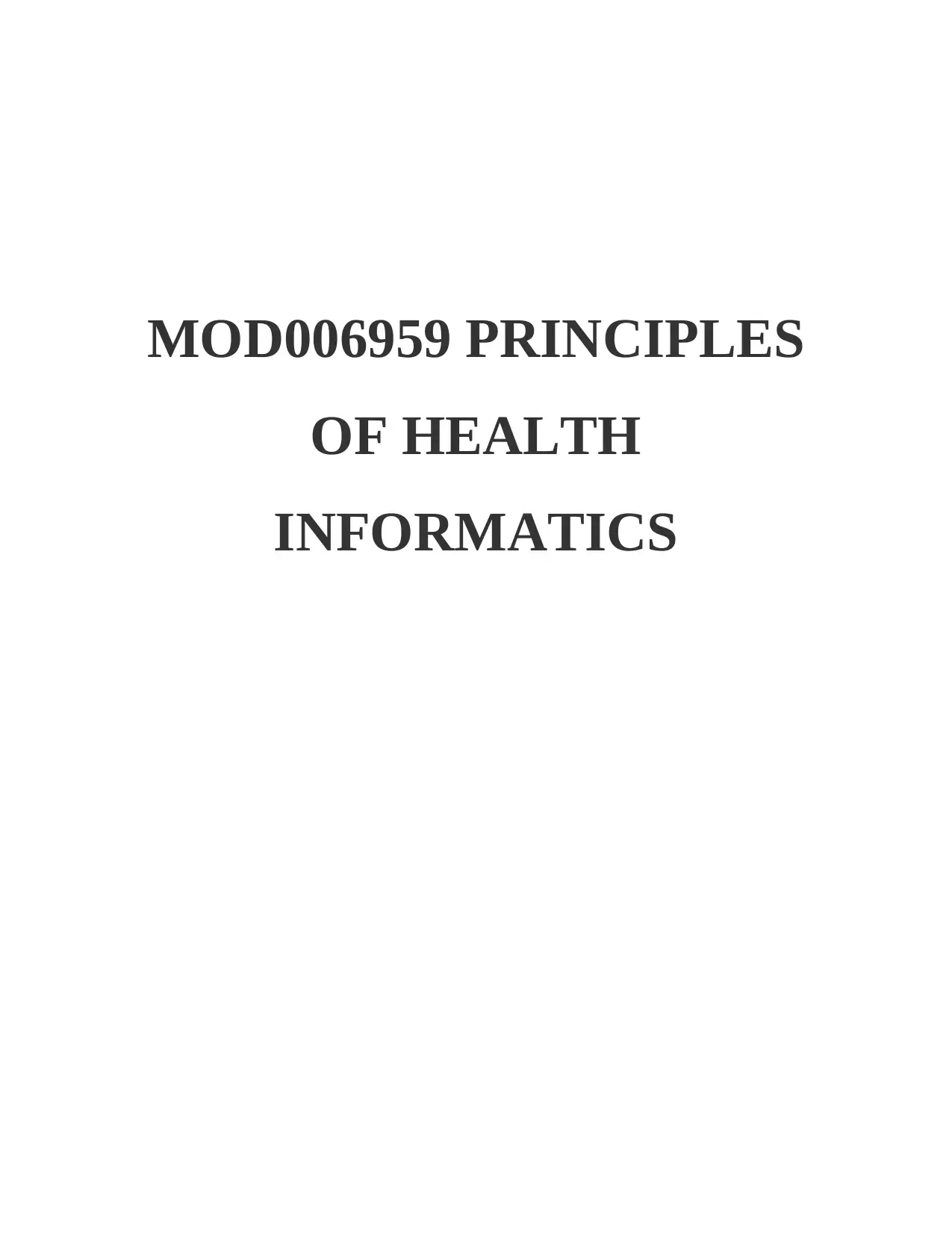
MOD006959 PRINCIPLES
OF HEALTH
INFORMATICS
OF HEALTH
INFORMATICS
Paraphrase This Document
Need a fresh take? Get an instant paraphrase of this document with our AI Paraphraser
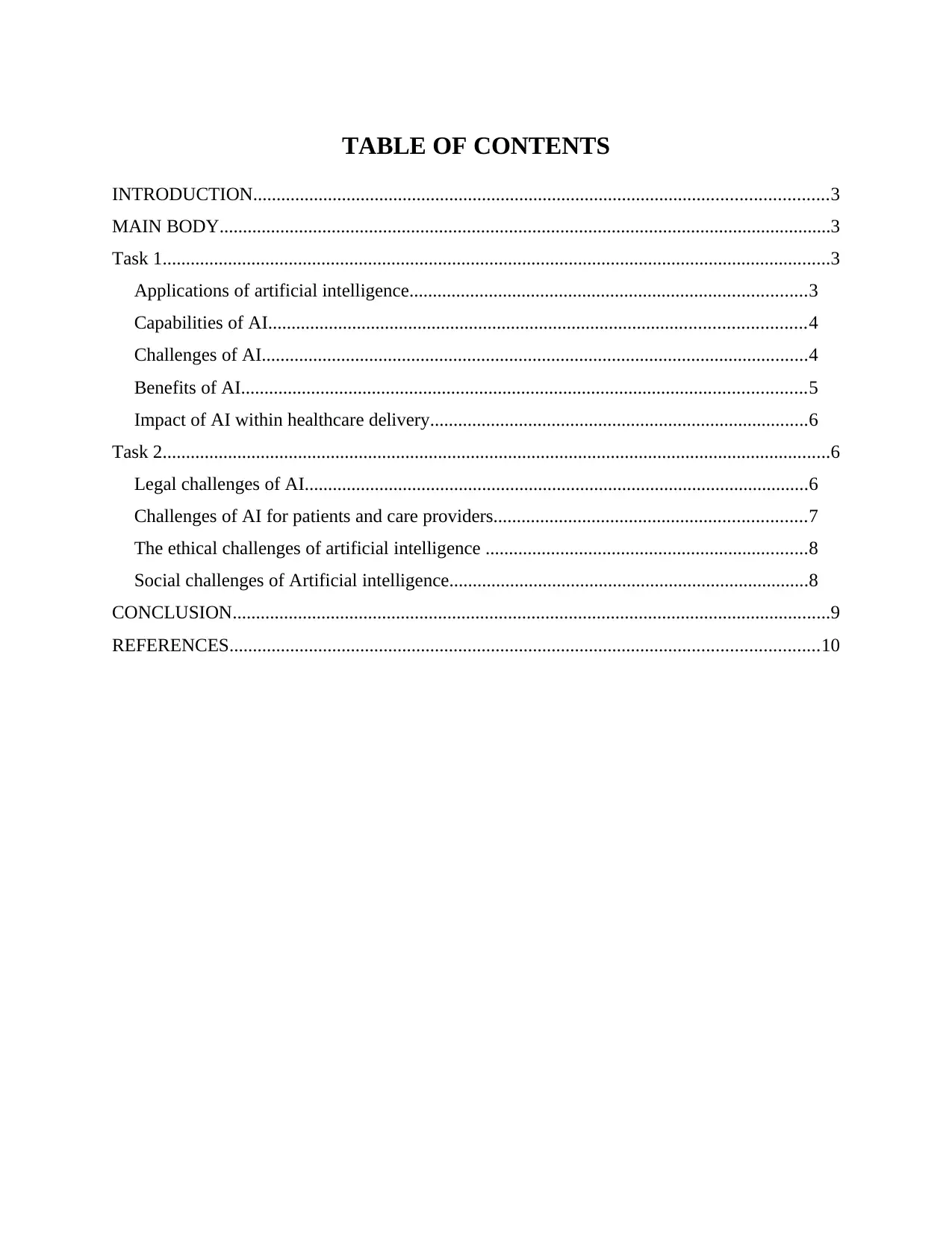
TABLE OF CONTENTS
INTRODUCTION...........................................................................................................................3
MAIN BODY...................................................................................................................................3
Task 1...............................................................................................................................................3
Applications of artificial intelligence.....................................................................................3
Capabilities of AI...................................................................................................................4
Challenges of AI.....................................................................................................................4
Benefits of AI.........................................................................................................................5
Impact of AI within healthcare delivery.................................................................................6
Task 2...............................................................................................................................................6
Legal challenges of AI............................................................................................................6
Challenges of AI for patients and care providers...................................................................7
The ethical challenges of artificial intelligence .....................................................................8
Social challenges of Artificial intelligence.............................................................................8
CONCLUSION................................................................................................................................9
REFERENCES..............................................................................................................................10
INTRODUCTION...........................................................................................................................3
MAIN BODY...................................................................................................................................3
Task 1...............................................................................................................................................3
Applications of artificial intelligence.....................................................................................3
Capabilities of AI...................................................................................................................4
Challenges of AI.....................................................................................................................4
Benefits of AI.........................................................................................................................5
Impact of AI within healthcare delivery.................................................................................6
Task 2...............................................................................................................................................6
Legal challenges of AI............................................................................................................6
Challenges of AI for patients and care providers...................................................................7
The ethical challenges of artificial intelligence .....................................................................8
Social challenges of Artificial intelligence.............................................................................8
CONCLUSION................................................................................................................................9
REFERENCES..............................................................................................................................10
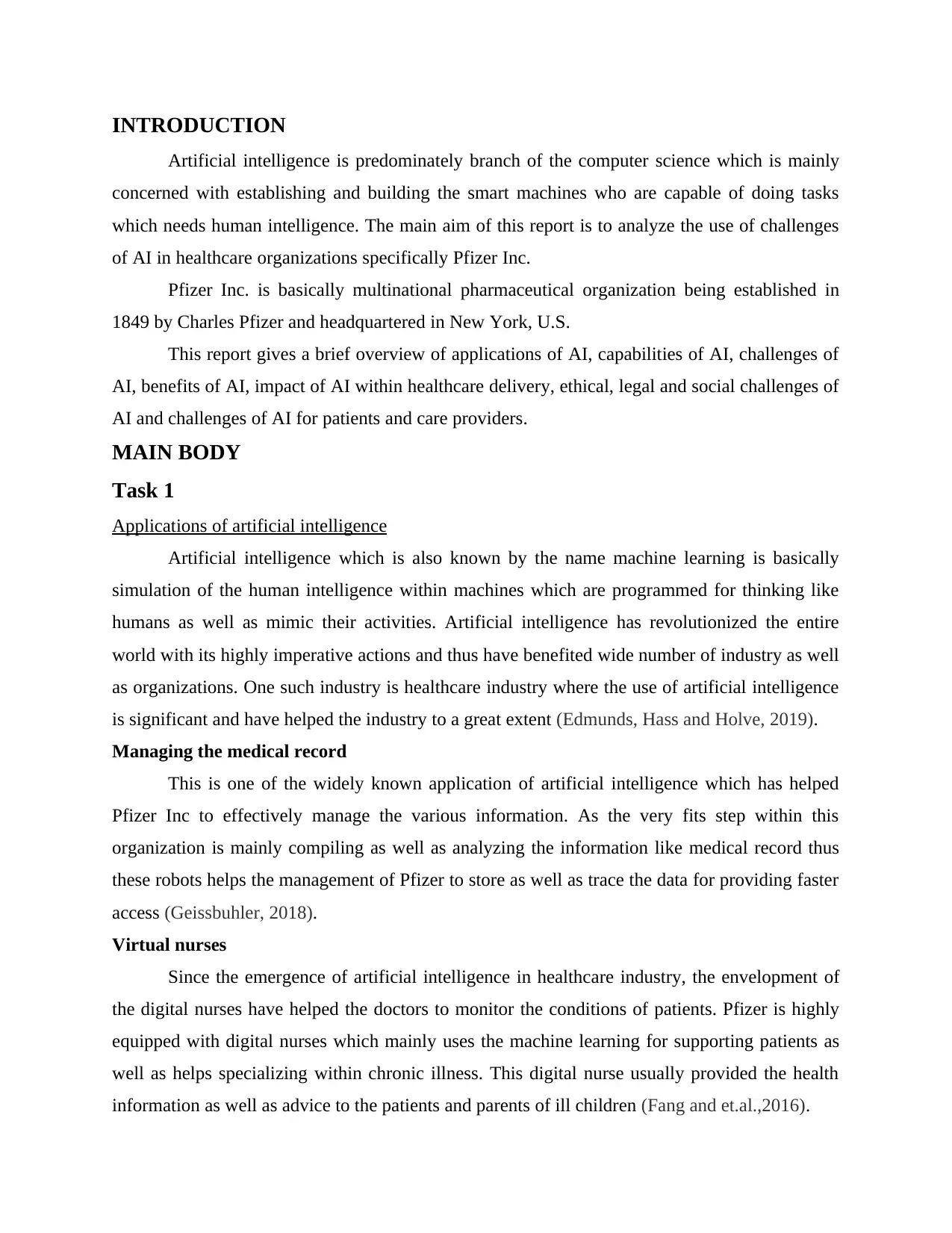
INTRODUCTION
Artificial intelligence is predominately branch of the computer science which is mainly
concerned with establishing and building the smart machines who are capable of doing tasks
which needs human intelligence. The main aim of this report is to analyze the use of challenges
of AI in healthcare organizations specifically Pfizer Inc.
Pfizer Inc. is basically multinational pharmaceutical organization being established in
1849 by Charles Pfizer and headquartered in New York, U.S.
This report gives a brief overview of applications of AI, capabilities of AI, challenges of
AI, benefits of AI, impact of AI within healthcare delivery, ethical, legal and social challenges of
AI and challenges of AI for patients and care providers.
MAIN BODY
Task 1
Applications of artificial intelligence
Artificial intelligence which is also known by the name machine learning is basically
simulation of the human intelligence within machines which are programmed for thinking like
humans as well as mimic their activities. Artificial intelligence has revolutionized the entire
world with its highly imperative actions and thus have benefited wide number of industry as well
as organizations. One such industry is healthcare industry where the use of artificial intelligence
is significant and have helped the industry to a great extent (Edmunds, Hass and Holve, 2019).
Managing the medical record
This is one of the widely known application of artificial intelligence which has helped
Pfizer Inc to effectively manage the various information. As the very fits step within this
organization is mainly compiling as well as analyzing the information like medical record thus
these robots helps the management of Pfizer to store as well as trace the data for providing faster
access (Geissbuhler, 2018).
Virtual nurses
Since the emergence of artificial intelligence in healthcare industry, the envelopment of
the digital nurses have helped the doctors to monitor the conditions of patients. Pfizer is highly
equipped with digital nurses which mainly uses the machine learning for supporting patients as
well as helps specializing within chronic illness. This digital nurse usually provided the health
information as well as advice to the patients and parents of ill children (Fang and et.al.,2016).
Artificial intelligence is predominately branch of the computer science which is mainly
concerned with establishing and building the smart machines who are capable of doing tasks
which needs human intelligence. The main aim of this report is to analyze the use of challenges
of AI in healthcare organizations specifically Pfizer Inc.
Pfizer Inc. is basically multinational pharmaceutical organization being established in
1849 by Charles Pfizer and headquartered in New York, U.S.
This report gives a brief overview of applications of AI, capabilities of AI, challenges of
AI, benefits of AI, impact of AI within healthcare delivery, ethical, legal and social challenges of
AI and challenges of AI for patients and care providers.
MAIN BODY
Task 1
Applications of artificial intelligence
Artificial intelligence which is also known by the name machine learning is basically
simulation of the human intelligence within machines which are programmed for thinking like
humans as well as mimic their activities. Artificial intelligence has revolutionized the entire
world with its highly imperative actions and thus have benefited wide number of industry as well
as organizations. One such industry is healthcare industry where the use of artificial intelligence
is significant and have helped the industry to a great extent (Edmunds, Hass and Holve, 2019).
Managing the medical record
This is one of the widely known application of artificial intelligence which has helped
Pfizer Inc to effectively manage the various information. As the very fits step within this
organization is mainly compiling as well as analyzing the information like medical record thus
these robots helps the management of Pfizer to store as well as trace the data for providing faster
access (Geissbuhler, 2018).
Virtual nurses
Since the emergence of artificial intelligence in healthcare industry, the envelopment of
the digital nurses have helped the doctors to monitor the conditions of patients. Pfizer is highly
equipped with digital nurses which mainly uses the machine learning for supporting patients as
well as helps specializing within chronic illness. This digital nurse usually provided the health
information as well as advice to the patients and parents of ill children (Fang and et.al.,2016).
⊘ This is a preview!⊘
Do you want full access?
Subscribe today to unlock all pages.

Trusted by 1+ million students worldwide
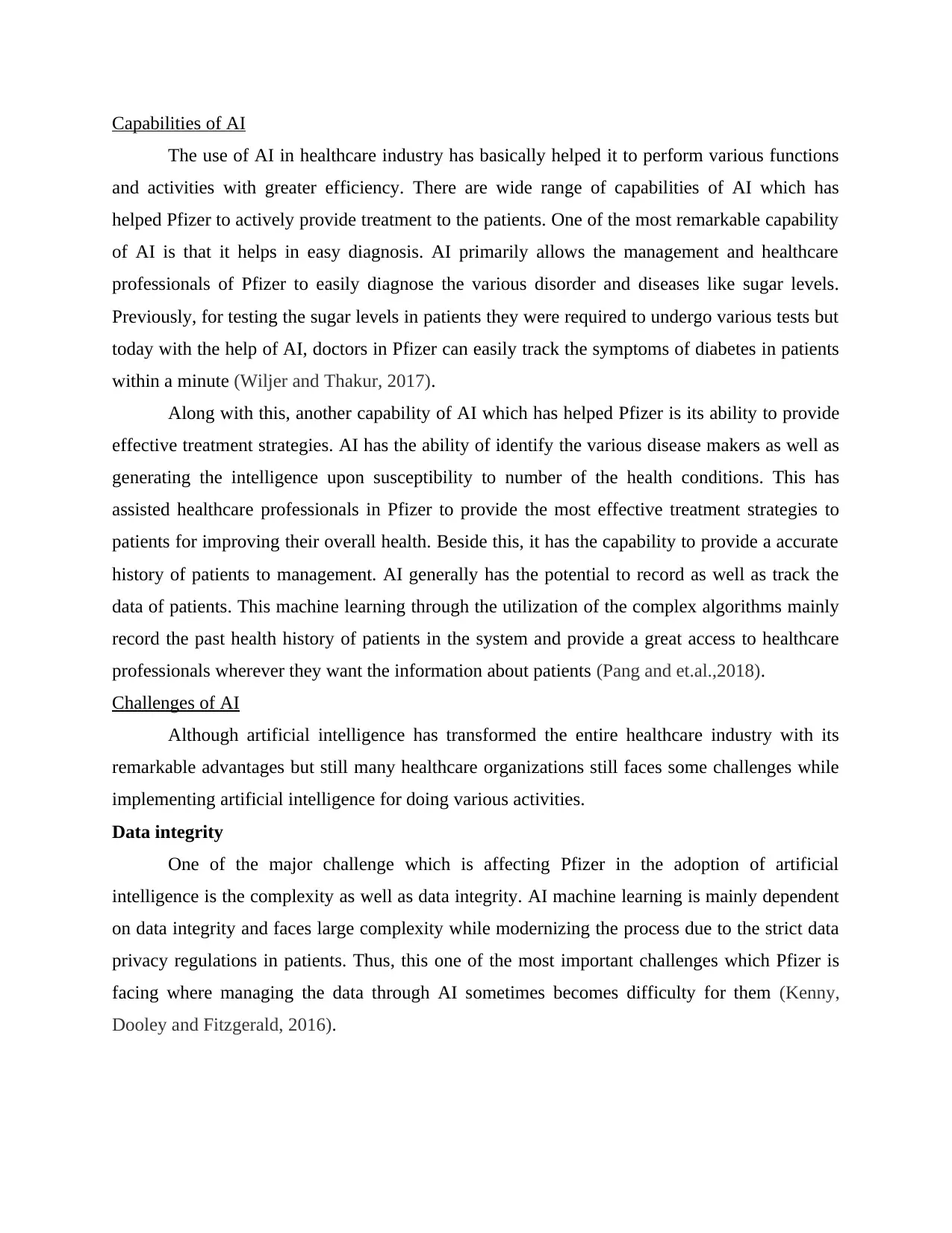
Capabilities of AI
The use of AI in healthcare industry has basically helped it to perform various functions
and activities with greater efficiency. There are wide range of capabilities of AI which has
helped Pfizer to actively provide treatment to the patients. One of the most remarkable capability
of AI is that it helps in easy diagnosis. AI primarily allows the management and healthcare
professionals of Pfizer to easily diagnose the various disorder and diseases like sugar levels.
Previously, for testing the sugar levels in patients they were required to undergo various tests but
today with the help of AI, doctors in Pfizer can easily track the symptoms of diabetes in patients
within a minute (Wiljer and Thakur, 2017).
Along with this, another capability of AI which has helped Pfizer is its ability to provide
effective treatment strategies. AI has the ability of identify the various disease makers as well as
generating the intelligence upon susceptibility to number of the health conditions. This has
assisted healthcare professionals in Pfizer to provide the most effective treatment strategies to
patients for improving their overall health. Beside this, it has the capability to provide a accurate
history of patients to management. AI generally has the potential to record as well as track the
data of patients. This machine learning through the utilization of the complex algorithms mainly
record the past health history of patients in the system and provide a great access to healthcare
professionals wherever they want the information about patients (Pang and et.al.,2018).
Challenges of AI
Although artificial intelligence has transformed the entire healthcare industry with its
remarkable advantages but still many healthcare organizations still faces some challenges while
implementing artificial intelligence for doing various activities.
Data integrity
One of the major challenge which is affecting Pfizer in the adoption of artificial
intelligence is the complexity as well as data integrity. AI machine learning is mainly dependent
on data integrity and faces large complexity while modernizing the process due to the strict data
privacy regulations in patients. Thus, this one of the most important challenges which Pfizer is
facing where managing the data through AI sometimes becomes difficulty for them (Kenny,
Dooley and Fitzgerald, 2016).
The use of AI in healthcare industry has basically helped it to perform various functions
and activities with greater efficiency. There are wide range of capabilities of AI which has
helped Pfizer to actively provide treatment to the patients. One of the most remarkable capability
of AI is that it helps in easy diagnosis. AI primarily allows the management and healthcare
professionals of Pfizer to easily diagnose the various disorder and diseases like sugar levels.
Previously, for testing the sugar levels in patients they were required to undergo various tests but
today with the help of AI, doctors in Pfizer can easily track the symptoms of diabetes in patients
within a minute (Wiljer and Thakur, 2017).
Along with this, another capability of AI which has helped Pfizer is its ability to provide
effective treatment strategies. AI has the ability of identify the various disease makers as well as
generating the intelligence upon susceptibility to number of the health conditions. This has
assisted healthcare professionals in Pfizer to provide the most effective treatment strategies to
patients for improving their overall health. Beside this, it has the capability to provide a accurate
history of patients to management. AI generally has the potential to record as well as track the
data of patients. This machine learning through the utilization of the complex algorithms mainly
record the past health history of patients in the system and provide a great access to healthcare
professionals wherever they want the information about patients (Pang and et.al.,2018).
Challenges of AI
Although artificial intelligence has transformed the entire healthcare industry with its
remarkable advantages but still many healthcare organizations still faces some challenges while
implementing artificial intelligence for doing various activities.
Data integrity
One of the major challenge which is affecting Pfizer in the adoption of artificial
intelligence is the complexity as well as data integrity. AI machine learning is mainly dependent
on data integrity and faces large complexity while modernizing the process due to the strict data
privacy regulations in patients. Thus, this one of the most important challenges which Pfizer is
facing where managing the data through AI sometimes becomes difficulty for them (Kenny,
Dooley and Fitzgerald, 2016).
Paraphrase This Document
Need a fresh take? Get an instant paraphrase of this document with our AI Paraphraser
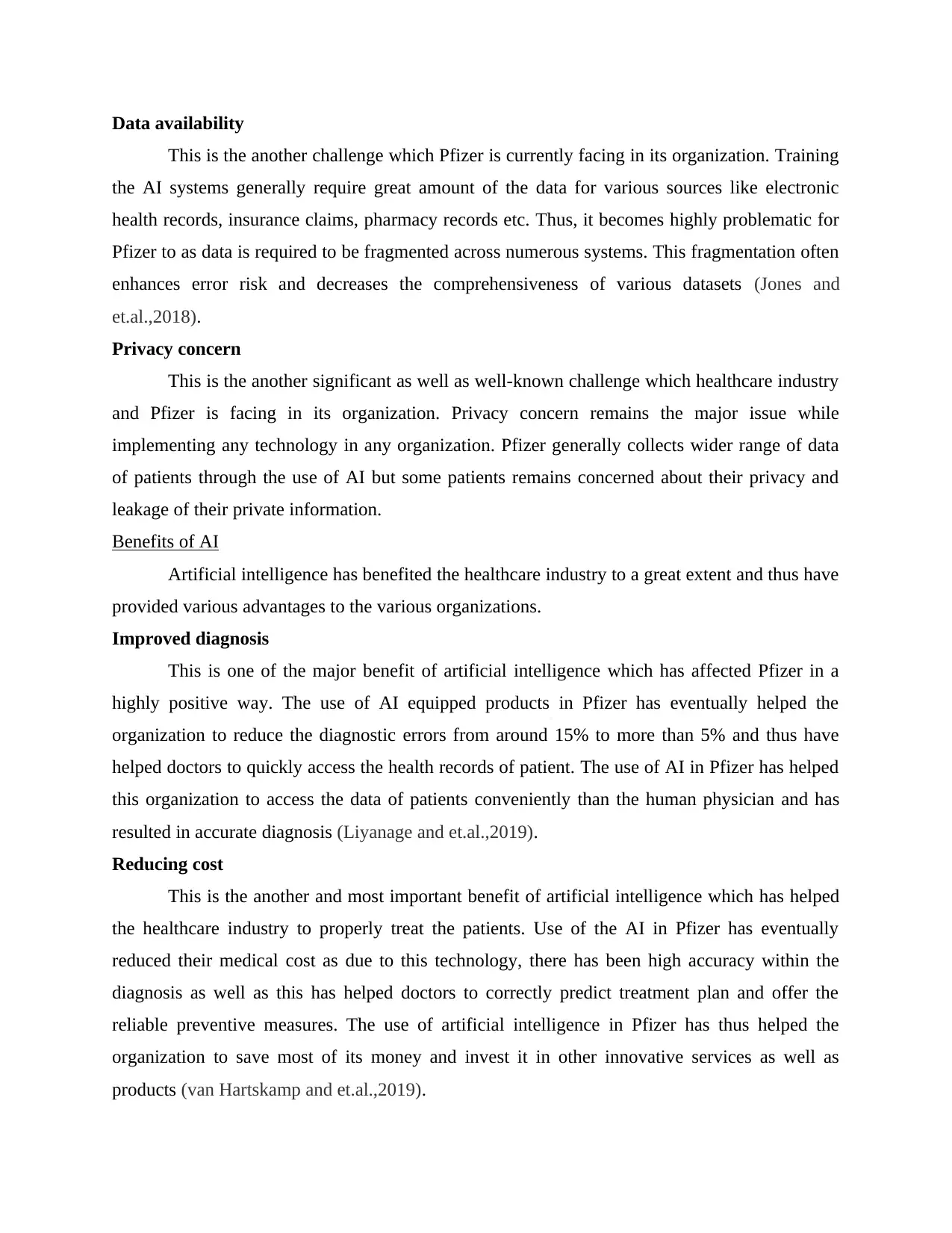
Data availability
This is the another challenge which Pfizer is currently facing in its organization. Training
the AI systems generally require great amount of the data for various sources like electronic
health records, insurance claims, pharmacy records etc. Thus, it becomes highly problematic for
Pfizer to as data is required to be fragmented across numerous systems. This fragmentation often
enhances error risk and decreases the comprehensiveness of various datasets (Jones and
et.al.,2018).
Privacy concern
This is the another significant as well as well-known challenge which healthcare industry
and Pfizer is facing in its organization. Privacy concern remains the major issue while
implementing any technology in any organization. Pfizer generally collects wider range of data
of patients through the use of AI but some patients remains concerned about their privacy and
leakage of their private information.
Benefits of AI
Artificial intelligence has benefited the healthcare industry to a great extent and thus have
provided various advantages to the various organizations.
Improved diagnosis
This is one of the major benefit of artificial intelligence which has affected Pfizer in a
highly positive way. The use of AI equipped products in Pfizer has eventually helped the
organization to reduce the diagnostic errors from around 15% to more than 5% and thus have
helped doctors to quickly access the health records of patient. The use of AI in Pfizer has helped
this organization to access the data of patients conveniently than the human physician and has
resulted in accurate diagnosis (Liyanage and et.al.,2019).
Reducing cost
This is the another and most important benefit of artificial intelligence which has helped
the healthcare industry to properly treat the patients. Use of the AI in Pfizer has eventually
reduced their medical cost as due to this technology, there has been high accuracy within the
diagnosis as well as this has helped doctors to correctly predict treatment plan and offer the
reliable preventive measures. The use of artificial intelligence in Pfizer has thus helped the
organization to save most of its money and invest it in other innovative services as well as
products (van Hartskamp and et.al.,2019).
This is the another challenge which Pfizer is currently facing in its organization. Training
the AI systems generally require great amount of the data for various sources like electronic
health records, insurance claims, pharmacy records etc. Thus, it becomes highly problematic for
Pfizer to as data is required to be fragmented across numerous systems. This fragmentation often
enhances error risk and decreases the comprehensiveness of various datasets (Jones and
et.al.,2018).
Privacy concern
This is the another significant as well as well-known challenge which healthcare industry
and Pfizer is facing in its organization. Privacy concern remains the major issue while
implementing any technology in any organization. Pfizer generally collects wider range of data
of patients through the use of AI but some patients remains concerned about their privacy and
leakage of their private information.
Benefits of AI
Artificial intelligence has benefited the healthcare industry to a great extent and thus have
provided various advantages to the various organizations.
Improved diagnosis
This is one of the major benefit of artificial intelligence which has affected Pfizer in a
highly positive way. The use of AI equipped products in Pfizer has eventually helped the
organization to reduce the diagnostic errors from around 15% to more than 5% and thus have
helped doctors to quickly access the health records of patient. The use of AI in Pfizer has helped
this organization to access the data of patients conveniently than the human physician and has
resulted in accurate diagnosis (Liyanage and et.al.,2019).
Reducing cost
This is the another and most important benefit of artificial intelligence which has helped
the healthcare industry to properly treat the patients. Use of the AI in Pfizer has eventually
reduced their medical cost as due to this technology, there has been high accuracy within the
diagnosis as well as this has helped doctors to correctly predict treatment plan and offer the
reliable preventive measures. The use of artificial intelligence in Pfizer has thus helped the
organization to save most of its money and invest it in other innovative services as well as
products (van Hartskamp and et.al.,2019).
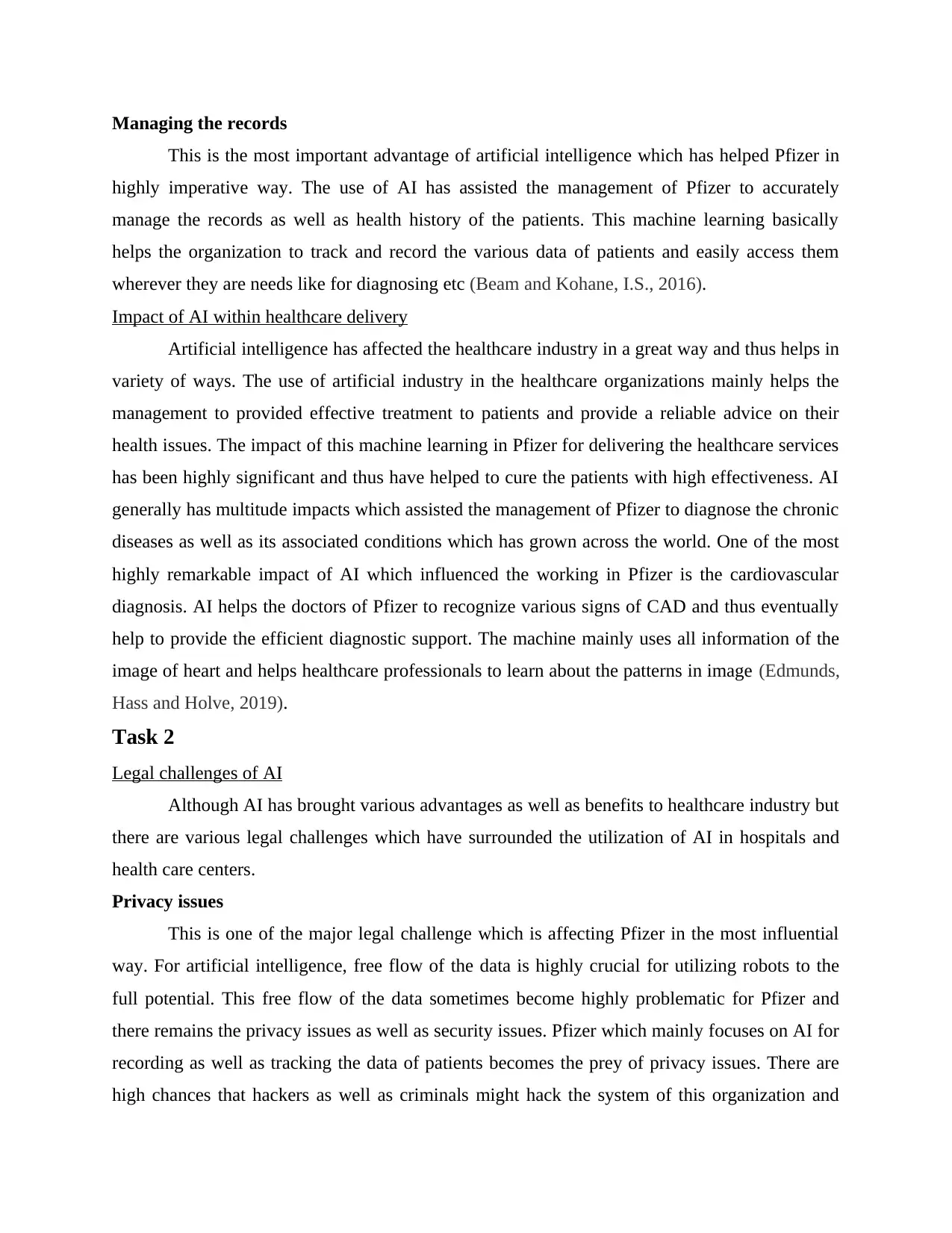
Managing the records
This is the most important advantage of artificial intelligence which has helped Pfizer in
highly imperative way. The use of AI has assisted the management of Pfizer to accurately
manage the records as well as health history of the patients. This machine learning basically
helps the organization to track and record the various data of patients and easily access them
wherever they are needs like for diagnosing etc (Beam and Kohane, I.S., 2016).
Impact of AI within healthcare delivery
Artificial intelligence has affected the healthcare industry in a great way and thus helps in
variety of ways. The use of artificial industry in the healthcare organizations mainly helps the
management to provided effective treatment to patients and provide a reliable advice on their
health issues. The impact of this machine learning in Pfizer for delivering the healthcare services
has been highly significant and thus have helped to cure the patients with high effectiveness. AI
generally has multitude impacts which assisted the management of Pfizer to diagnose the chronic
diseases as well as its associated conditions which has grown across the world. One of the most
highly remarkable impact of AI which influenced the working in Pfizer is the cardiovascular
diagnosis. AI helps the doctors of Pfizer to recognize various signs of CAD and thus eventually
help to provide the efficient diagnostic support. The machine mainly uses all information of the
image of heart and helps healthcare professionals to learn about the patterns in image (Edmunds,
Hass and Holve, 2019).
Task 2
Legal challenges of AI
Although AI has brought various advantages as well as benefits to healthcare industry but
there are various legal challenges which have surrounded the utilization of AI in hospitals and
health care centers.
Privacy issues
This is one of the major legal challenge which is affecting Pfizer in the most influential
way. For artificial intelligence, free flow of the data is highly crucial for utilizing robots to the
full potential. This free flow of the data sometimes become highly problematic for Pfizer and
there remains the privacy issues as well as security issues. Pfizer which mainly focuses on AI for
recording as well as tracking the data of patients becomes the prey of privacy issues. There are
high chances that hackers as well as criminals might hack the system of this organization and
This is the most important advantage of artificial intelligence which has helped Pfizer in
highly imperative way. The use of AI has assisted the management of Pfizer to accurately
manage the records as well as health history of the patients. This machine learning basically
helps the organization to track and record the various data of patients and easily access them
wherever they are needs like for diagnosing etc (Beam and Kohane, I.S., 2016).
Impact of AI within healthcare delivery
Artificial intelligence has affected the healthcare industry in a great way and thus helps in
variety of ways. The use of artificial industry in the healthcare organizations mainly helps the
management to provided effective treatment to patients and provide a reliable advice on their
health issues. The impact of this machine learning in Pfizer for delivering the healthcare services
has been highly significant and thus have helped to cure the patients with high effectiveness. AI
generally has multitude impacts which assisted the management of Pfizer to diagnose the chronic
diseases as well as its associated conditions which has grown across the world. One of the most
highly remarkable impact of AI which influenced the working in Pfizer is the cardiovascular
diagnosis. AI helps the doctors of Pfizer to recognize various signs of CAD and thus eventually
help to provide the efficient diagnostic support. The machine mainly uses all information of the
image of heart and helps healthcare professionals to learn about the patterns in image (Edmunds,
Hass and Holve, 2019).
Task 2
Legal challenges of AI
Although AI has brought various advantages as well as benefits to healthcare industry but
there are various legal challenges which have surrounded the utilization of AI in hospitals and
health care centers.
Privacy issues
This is one of the major legal challenge which is affecting Pfizer in the most influential
way. For artificial intelligence, free flow of the data is highly crucial for utilizing robots to the
full potential. This free flow of the data sometimes become highly problematic for Pfizer and
there remains the privacy issues as well as security issues. Pfizer which mainly focuses on AI for
recording as well as tracking the data of patients becomes the prey of privacy issues. There are
high chances that hackers as well as criminals might hack the system of this organization and
⊘ This is a preview!⊘
Do you want full access?
Subscribe today to unlock all pages.

Trusted by 1+ million students worldwide
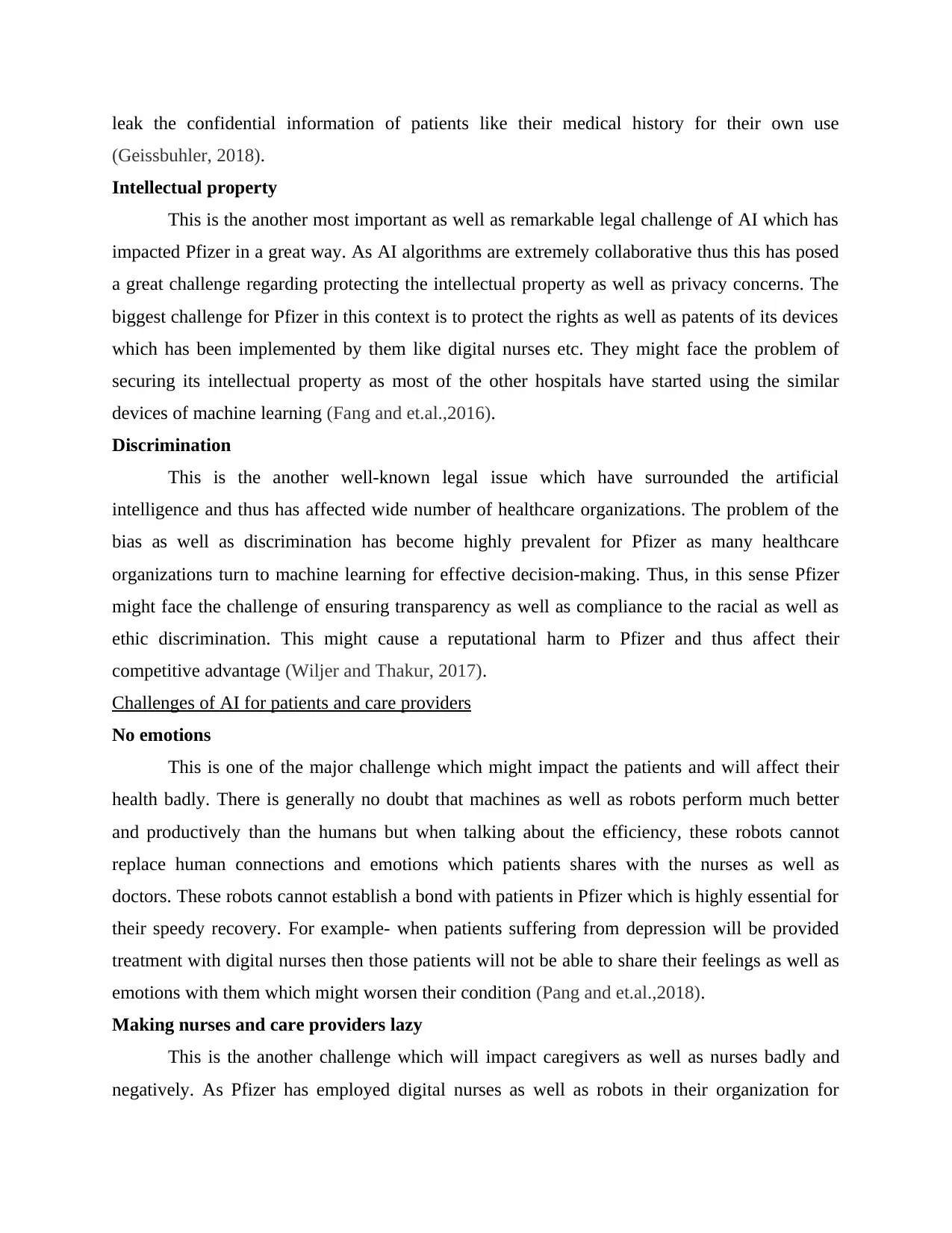
leak the confidential information of patients like their medical history for their own use
(Geissbuhler, 2018).
Intellectual property
This is the another most important as well as remarkable legal challenge of AI which has
impacted Pfizer in a great way. As AI algorithms are extremely collaborative thus this has posed
a great challenge regarding protecting the intellectual property as well as privacy concerns. The
biggest challenge for Pfizer in this context is to protect the rights as well as patents of its devices
which has been implemented by them like digital nurses etc. They might face the problem of
securing its intellectual property as most of the other hospitals have started using the similar
devices of machine learning (Fang and et.al.,2016).
Discrimination
This is the another well-known legal issue which have surrounded the artificial
intelligence and thus has affected wide number of healthcare organizations. The problem of the
bias as well as discrimination has become highly prevalent for Pfizer as many healthcare
organizations turn to machine learning for effective decision-making. Thus, in this sense Pfizer
might face the challenge of ensuring transparency as well as compliance to the racial as well as
ethic discrimination. This might cause a reputational harm to Pfizer and thus affect their
competitive advantage (Wiljer and Thakur, 2017).
Challenges of AI for patients and care providers
No emotions
This is one of the major challenge which might impact the patients and will affect their
health badly. There is generally no doubt that machines as well as robots perform much better
and productively than the humans but when talking about the efficiency, these robots cannot
replace human connections and emotions which patients shares with the nurses as well as
doctors. These robots cannot establish a bond with patients in Pfizer which is highly essential for
their speedy recovery. For example- when patients suffering from depression will be provided
treatment with digital nurses then those patients will not be able to share their feelings as well as
emotions with them which might worsen their condition (Pang and et.al.,2018).
Making nurses and care providers lazy
This is the another challenge which will impact caregivers as well as nurses badly and
negatively. As Pfizer has employed digital nurses as well as robots in their organization for
(Geissbuhler, 2018).
Intellectual property
This is the another most important as well as remarkable legal challenge of AI which has
impacted Pfizer in a great way. As AI algorithms are extremely collaborative thus this has posed
a great challenge regarding protecting the intellectual property as well as privacy concerns. The
biggest challenge for Pfizer in this context is to protect the rights as well as patents of its devices
which has been implemented by them like digital nurses etc. They might face the problem of
securing its intellectual property as most of the other hospitals have started using the similar
devices of machine learning (Fang and et.al.,2016).
Discrimination
This is the another well-known legal issue which have surrounded the artificial
intelligence and thus has affected wide number of healthcare organizations. The problem of the
bias as well as discrimination has become highly prevalent for Pfizer as many healthcare
organizations turn to machine learning for effective decision-making. Thus, in this sense Pfizer
might face the challenge of ensuring transparency as well as compliance to the racial as well as
ethic discrimination. This might cause a reputational harm to Pfizer and thus affect their
competitive advantage (Wiljer and Thakur, 2017).
Challenges of AI for patients and care providers
No emotions
This is one of the major challenge which might impact the patients and will affect their
health badly. There is generally no doubt that machines as well as robots perform much better
and productively than the humans but when talking about the efficiency, these robots cannot
replace human connections and emotions which patients shares with the nurses as well as
doctors. These robots cannot establish a bond with patients in Pfizer which is highly essential for
their speedy recovery. For example- when patients suffering from depression will be provided
treatment with digital nurses then those patients will not be able to share their feelings as well as
emotions with them which might worsen their condition (Pang and et.al.,2018).
Making nurses and care providers lazy
This is the another challenge which will impact caregivers as well as nurses badly and
negatively. As Pfizer has employed digital nurses as well as robots in their organization for
Paraphrase This Document
Need a fresh take? Get an instant paraphrase of this document with our AI Paraphraser
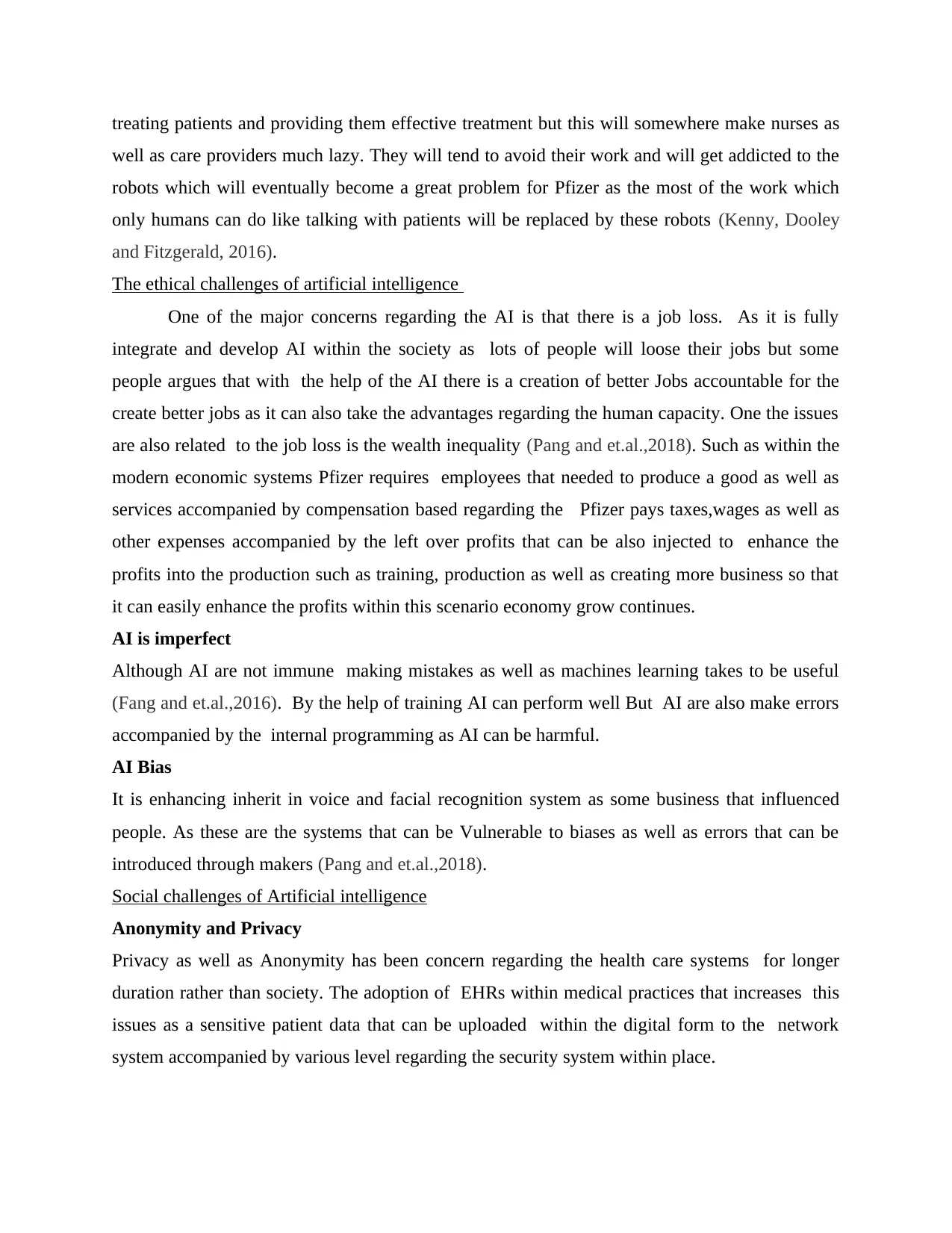
treating patients and providing them effective treatment but this will somewhere make nurses as
well as care providers much lazy. They will tend to avoid their work and will get addicted to the
robots which will eventually become a great problem for Pfizer as the most of the work which
only humans can do like talking with patients will be replaced by these robots (Kenny, Dooley
and Fitzgerald, 2016).
The ethical challenges of artificial intelligence
One of the major concerns regarding the AI is that there is a job loss. As it is fully
integrate and develop AI within the society as lots of people will loose their jobs but some
people argues that with the help of the AI there is a creation of better Jobs accountable for the
create better jobs as it can also take the advantages regarding the human capacity. One the issues
are also related to the job loss is the wealth inequality (Pang and et.al.,2018). Such as within the
modern economic systems Pfizer requires employees that needed to produce a good as well as
services accompanied by compensation based regarding the Pfizer pays taxes,wages as well as
other expenses accompanied by the left over profits that can be also injected to enhance the
profits into the production such as training, production as well as creating more business so that
it can easily enhance the profits within this scenario economy grow continues.
AI is imperfect
Although AI are not immune making mistakes as well as machines learning takes to be useful
(Fang and et.al.,2016). By the help of training AI can perform well But AI are also make errors
accompanied by the internal programming as AI can be harmful.
AI Bias
It is enhancing inherit in voice and facial recognition system as some business that influenced
people. As these are the systems that can be Vulnerable to biases as well as errors that can be
introduced through makers (Pang and et.al.,2018).
Social challenges of Artificial intelligence
Anonymity and Privacy
Privacy as well as Anonymity has been concern regarding the health care systems for longer
duration rather than society. The adoption of EHRs within medical practices that increases this
issues as a sensitive patient data that can be uploaded within the digital form to the network
system accompanied by various level regarding the security system within place.
well as care providers much lazy. They will tend to avoid their work and will get addicted to the
robots which will eventually become a great problem for Pfizer as the most of the work which
only humans can do like talking with patients will be replaced by these robots (Kenny, Dooley
and Fitzgerald, 2016).
The ethical challenges of artificial intelligence
One of the major concerns regarding the AI is that there is a job loss. As it is fully
integrate and develop AI within the society as lots of people will loose their jobs but some
people argues that with the help of the AI there is a creation of better Jobs accountable for the
create better jobs as it can also take the advantages regarding the human capacity. One the issues
are also related to the job loss is the wealth inequality (Pang and et.al.,2018). Such as within the
modern economic systems Pfizer requires employees that needed to produce a good as well as
services accompanied by compensation based regarding the Pfizer pays taxes,wages as well as
other expenses accompanied by the left over profits that can be also injected to enhance the
profits into the production such as training, production as well as creating more business so that
it can easily enhance the profits within this scenario economy grow continues.
AI is imperfect
Although AI are not immune making mistakes as well as machines learning takes to be useful
(Fang and et.al.,2016). By the help of training AI can perform well But AI are also make errors
accompanied by the internal programming as AI can be harmful.
AI Bias
It is enhancing inherit in voice and facial recognition system as some business that influenced
people. As these are the systems that can be Vulnerable to biases as well as errors that can be
introduced through makers (Pang and et.al.,2018).
Social challenges of Artificial intelligence
Anonymity and Privacy
Privacy as well as Anonymity has been concern regarding the health care systems for longer
duration rather than society. The adoption of EHRs within medical practices that increases this
issues as a sensitive patient data that can be uploaded within the digital form to the network
system accompanied by various level regarding the security system within place.
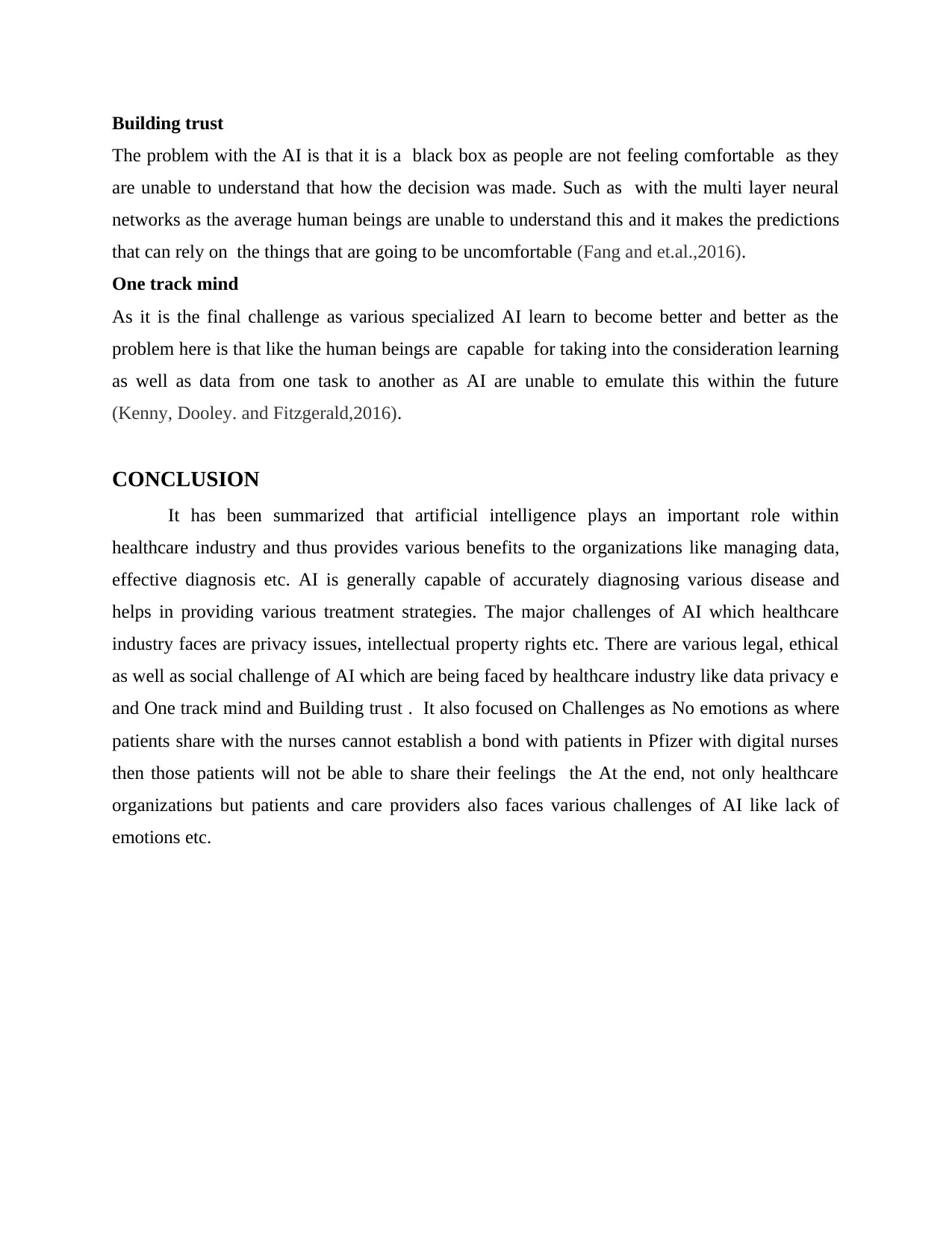
Building trust
The problem with the AI is that it is a black box as people are not feeling comfortable as they
are unable to understand that how the decision was made. Such as with the multi layer neural
networks as the average human beings are unable to understand this and it makes the predictions
that can rely on the things that are going to be uncomfortable (Fang and et.al.,2016).
One track mind
As it is the final challenge as various specialized AI learn to become better and better as the
problem here is that like the human beings are capable for taking into the consideration learning
as well as data from one task to another as AI are unable to emulate this within the future
(Kenny, Dooley. and Fitzgerald,2016).
CONCLUSION
It has been summarized that artificial intelligence plays an important role within
healthcare industry and thus provides various benefits to the organizations like managing data,
effective diagnosis etc. AI is generally capable of accurately diagnosing various disease and
helps in providing various treatment strategies. The major challenges of AI which healthcare
industry faces are privacy issues, intellectual property rights etc. There are various legal, ethical
as well as social challenge of AI which are being faced by healthcare industry like data privacy e
and One track mind and Building trust . It also focused on Challenges as No emotions as where
patients share with the nurses cannot establish a bond with patients in Pfizer with digital nurses
then those patients will not be able to share their feelings the At the end, not only healthcare
organizations but patients and care providers also faces various challenges of AI like lack of
emotions etc.
The problem with the AI is that it is a black box as people are not feeling comfortable as they
are unable to understand that how the decision was made. Such as with the multi layer neural
networks as the average human beings are unable to understand this and it makes the predictions
that can rely on the things that are going to be uncomfortable (Fang and et.al.,2016).
One track mind
As it is the final challenge as various specialized AI learn to become better and better as the
problem here is that like the human beings are capable for taking into the consideration learning
as well as data from one task to another as AI are unable to emulate this within the future
(Kenny, Dooley. and Fitzgerald,2016).
CONCLUSION
It has been summarized that artificial intelligence plays an important role within
healthcare industry and thus provides various benefits to the organizations like managing data,
effective diagnosis etc. AI is generally capable of accurately diagnosing various disease and
helps in providing various treatment strategies. The major challenges of AI which healthcare
industry faces are privacy issues, intellectual property rights etc. There are various legal, ethical
as well as social challenge of AI which are being faced by healthcare industry like data privacy e
and One track mind and Building trust . It also focused on Challenges as No emotions as where
patients share with the nurses cannot establish a bond with patients in Pfizer with digital nurses
then those patients will not be able to share their feelings the At the end, not only healthcare
organizations but patients and care providers also faces various challenges of AI like lack of
emotions etc.
⊘ This is a preview!⊘
Do you want full access?
Subscribe today to unlock all pages.

Trusted by 1+ million students worldwide
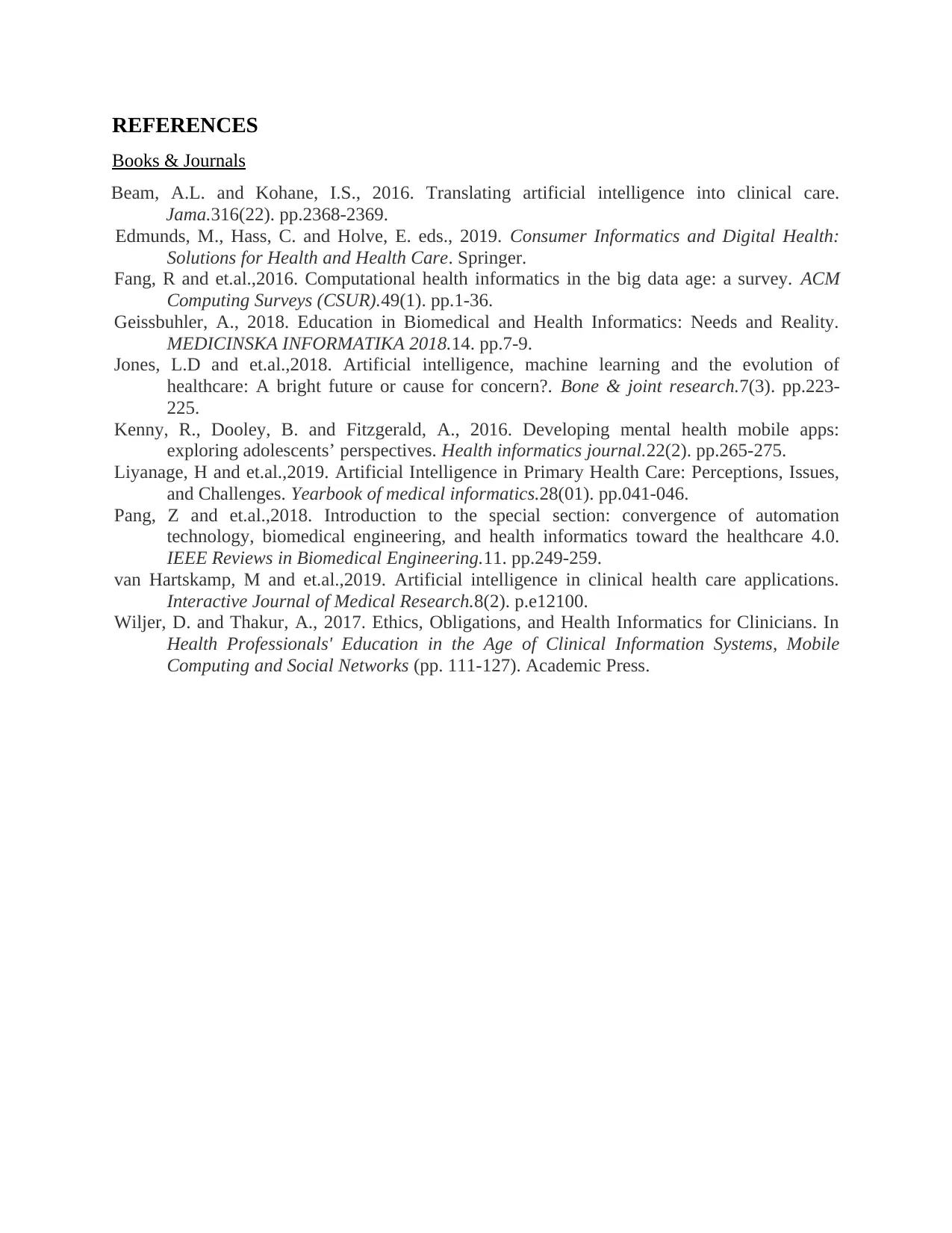
REFERENCES
Books & Journals
Beam, A.L. and Kohane, I.S., 2016. Translating artificial intelligence into clinical care.
Jama.316(22). pp.2368-2369.
Edmunds, M., Hass, C. and Holve, E. eds., 2019. Consumer Informatics and Digital Health:
Solutions for Health and Health Care. Springer.
Fang, R and et.al.,2016. Computational health informatics in the big data age: a survey. ACM
Computing Surveys (CSUR).49(1). pp.1-36.
Geissbuhler, A., 2018. Education in Biomedical and Health Informatics: Needs and Reality.
MEDICINSKA INFORMATIKA 2018.14. pp.7-9.
Jones, L.D and et.al.,2018. Artificial intelligence, machine learning and the evolution of
healthcare: A bright future or cause for concern?. Bone & joint research.7(3). pp.223-
225.
Kenny, R., Dooley, B. and Fitzgerald, A., 2016. Developing mental health mobile apps:
exploring adolescents’ perspectives. Health informatics journal.22(2). pp.265-275.
Liyanage, H and et.al.,2019. Artificial Intelligence in Primary Health Care: Perceptions, Issues,
and Challenges. Yearbook of medical informatics.28(01). pp.041-046.
Pang, Z and et.al.,2018. Introduction to the special section: convergence of automation
technology, biomedical engineering, and health informatics toward the healthcare 4.0.
IEEE Reviews in Biomedical Engineering.11. pp.249-259.
van Hartskamp, M and et.al.,2019. Artificial intelligence in clinical health care applications.
Interactive Journal of Medical Research.8(2). p.e12100.
Wiljer, D. and Thakur, A., 2017. Ethics, Obligations, and Health Informatics for Clinicians. In
Health Professionals' Education in the Age of Clinical Information Systems, Mobile
Computing and Social Networks (pp. 111-127). Academic Press.
Books & Journals
Beam, A.L. and Kohane, I.S., 2016. Translating artificial intelligence into clinical care.
Jama.316(22). pp.2368-2369.
Edmunds, M., Hass, C. and Holve, E. eds., 2019. Consumer Informatics and Digital Health:
Solutions for Health and Health Care. Springer.
Fang, R and et.al.,2016. Computational health informatics in the big data age: a survey. ACM
Computing Surveys (CSUR).49(1). pp.1-36.
Geissbuhler, A., 2018. Education in Biomedical and Health Informatics: Needs and Reality.
MEDICINSKA INFORMATIKA 2018.14. pp.7-9.
Jones, L.D and et.al.,2018. Artificial intelligence, machine learning and the evolution of
healthcare: A bright future or cause for concern?. Bone & joint research.7(3). pp.223-
225.
Kenny, R., Dooley, B. and Fitzgerald, A., 2016. Developing mental health mobile apps:
exploring adolescents’ perspectives. Health informatics journal.22(2). pp.265-275.
Liyanage, H and et.al.,2019. Artificial Intelligence in Primary Health Care: Perceptions, Issues,
and Challenges. Yearbook of medical informatics.28(01). pp.041-046.
Pang, Z and et.al.,2018. Introduction to the special section: convergence of automation
technology, biomedical engineering, and health informatics toward the healthcare 4.0.
IEEE Reviews in Biomedical Engineering.11. pp.249-259.
van Hartskamp, M and et.al.,2019. Artificial intelligence in clinical health care applications.
Interactive Journal of Medical Research.8(2). p.e12100.
Wiljer, D. and Thakur, A., 2017. Ethics, Obligations, and Health Informatics for Clinicians. In
Health Professionals' Education in the Age of Clinical Information Systems, Mobile
Computing and Social Networks (pp. 111-127). Academic Press.
1 out of 10
Related Documents
Your All-in-One AI-Powered Toolkit for Academic Success.
+13062052269
info@desklib.com
Available 24*7 on WhatsApp / Email
![[object Object]](/_next/static/media/star-bottom.7253800d.svg)
Unlock your academic potential
Copyright © 2020–2026 A2Z Services. All Rights Reserved. Developed and managed by ZUCOL.





